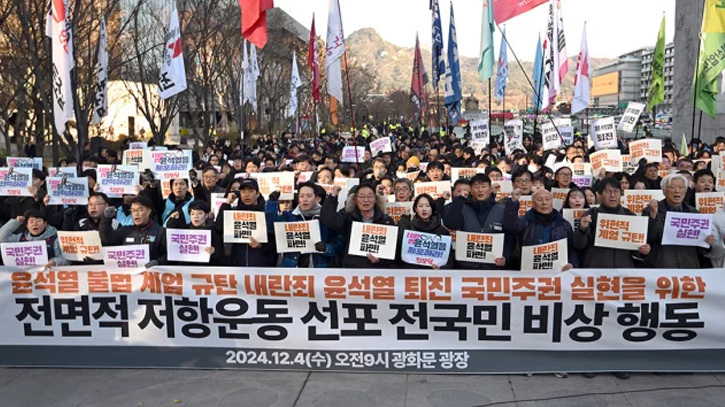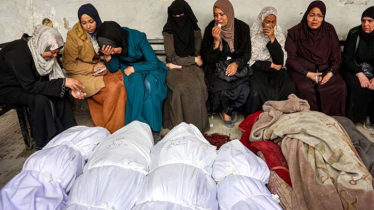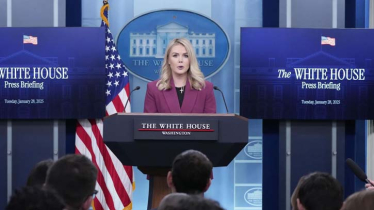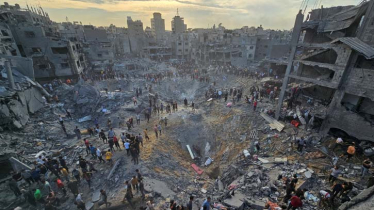
Photo: Collected
South Korea's political landscape was shaken on Wednesday as the main opposition Democratic Party called for President Yoon Suk Yeol's immediate resignation or impeachment. The demand came hours after Yoon rescinded a controversial martial law declaration, which had briefly brought military troops to parliament.
Yoon's abrupt announcement of martial law on Tuesday evening aimed to combat what he termed "anti-state" forces but was overturned by a unanimous parliamentary vote. This marked South Korea's first use of martial law in over 40 years, harking back to its pre-democracy era.
Opposition Outrage and Impeachment Threat
The Democratic Party, holding a parliamentary majority, condemned Yoon's actions as unconstitutional and accused him of rebellion.
"President Yoon Suk Yeol's martial law declaration was a clear violation of the constitution... a grave act of rebellion," the party said in a statement, promising impeachment proceedings if Yoon refused to step down.
An impeachment would require a two-thirds parliamentary vote, needing support from at least 200 lawmakers. The Democratic Party and smaller opposition factions collectively control 192 seats. Notably, 18 members of Yoon's ruling People Power Party (PPP) joined the 190-0 vote to annul the martial law.
If impeached, Yoon would be stripped of presidential powers pending a Constitutional Court ruling, with Prime Minister Han Duck-soo assuming interim responsibilities.
Yoon's Declaration and Military Deployment
Yoon's martial law authorized troop deployments to restrict parliamentary activities, sparking comparisons to South Korea's military-backed governments of the past. Protesters outside the National Assembly faced soldiers armed with assault rifles and military helicopters.
While lawmakers were initially blocked from entering the National Assembly, opposition leader Lee Jae-myung livestreamed himself scaling a wall to access the chamber. Despite the heavy military presence, no major violence was reported, and troops withdrew after the vote to lift the martial law.
Critics, including legal experts and opposition leaders, argued Yoon's actions violated constitutional provisions that limit martial law to wartime or comparable national emergencies. The constitution explicitly prohibits restrictions on parliamentary functions, which Yoon's declaration attempted to enforce.
International and Domestic Responses
In Washington, the White House expressed "serious concern" over the events, noting that the Biden administration was not informed in advance of Yoon's martial law declaration. Pentagon officials confirmed no impact on the 27,000 U.S. troops stationed in South Korea.
Domestically, the People Power Party leader Han Dong-hun criticized Yoon's actions as unconstitutional, urging him to dismiss Defense Minister Kim Yong Hyun, who reportedly recommended the declaration.
Public reaction remained relatively muted, with life in Seoul appearing normal on Wednesday. Tourists and residents went about their routines, though increased police presence and lingering tension hinted at the political turmoil.
Echoes of South Korea's Democratic Struggles
President Yoon's martial law declaration and its swift reversal highlighted South Korea's turbulent political history, including its transition to democracy in the late 1980s. Observers compared the current crisis to the 2017 impeachment of former President Park Geun-hye, who was removed from office and later imprisoned for corruption.
Natalia Slavney, an analyst with the Stimson Center's 38 North program, described the martial law as a "serious backslide of democracy" in South Korea, noting an "alarming trend of abuse" during Yoon's presidency.
As calls for Yoon's resignation grow louder, South Korea faces an uncertain political future. The crisis underscores the fragility of democratic norms in the face of escalating political conflicts.
Messenger/Tareq








